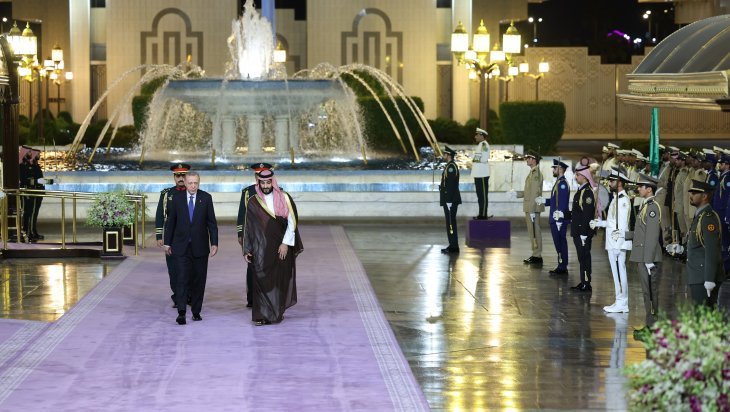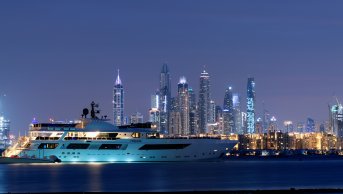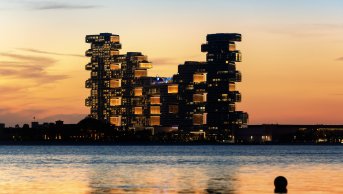From Normalization to Consolidation in Türkiye-Gulf Relations: President Erdoğan's Visits to Saudi Arabia, Qatar, and the UAE

After the completion of the Presidential elections in May, a new cabinet was formed, and Turkish foreign policy entered a period of renewed dynamism. Critical decisions regarding Türkiye's military policy, EU policy, relations with Russia and Ukraine, and relations with the United States were made during the NATO Leaders Summit held in Lithuania. Türkiye also seems to be on the path to overcoming its issues with Sweden and Finland through mutual trust-building. Amidst all this dynamism, President Recep Tayyip Erdoğan and his high-level delegation's visits to the Gulf countries have also brought about an acceleration in Türkiye's political, military, and geopolitical aspects of foreign policy. The President visited Saudi Arabia on July 17th, Qatar on July 18th, and the United Arab Emirates (UAE) on July 19th.
Background of the visits
While President Erdoğan's visits to the Gulf countries initially focused on trade, investment, and economic relations, they also held significant implications for military/defense and geopolitical matters.
The first stop of the visit was Jeddah, representing Saudi Arabia. In Jeddah, which can be regarded as Saudi Arabia's diplomatic capital, bilateral and inter-delegation meetings were held with Prime Minister and Crown Prince Mohammed bin Salman, and five agreements were signed. These agreements encompassed the promotion of mutual direct investment, cooperation in the media and communication sectors, the enhancement of defense cooperation, and energy cooperation agreements. Additionally, during the Türkiye-Saudi Arabia Business Forum organized by the Foreign Economic Relations Board (DEİK) and Saudi Arabian business circles, 16 agreements were signed, with the total value of agreements covering construction, engineering, and other technical sectors reaching $610 million.
Following the visit to Jeddah, President Erdoğan proceeded to Doha, where meetings were held with Emir Tamim and his delegation, and a joint declaration was issued to mark the 50th anniversary of diplomatic relations between Türkiye and Qatar, established in 1973. It was stated that nearly 100 cooperation documents have been signed between Türkiye and Qatar since the establishment of relations through the High Strategic Committee platform in 2015. Furthermore, an agreement was reached on conducting project-based cooperation between Türkiye and Qatar in third countries. President Erdoğan presented the first domestically produced Turkish car, TOGG, as a gift to Emir Tamim, just as he did to Mohammed bin Salman.
In Abu Dhabi, the final destination after Doha, President Erdoğan and his delegation were welcomed by UAE President Sheikh Mansur bin Zayed Al-Nahyan. The visit of the President and his delegation to the UAE reaffirmed the leading newspapers' claims that the relations between the two countries would be strengthened with this visit and that the two countries aimed to reach a trade volume of $40 billion within five years. It was emphasized that this was the fifth high-level meeting between Türkiye and the UAE in recent times. Regarding trade, investment, and economic relations between the two countries, Minister of Trade Ömer Bolat had previously stated that the UAE could invest $30 billion in the health sector, logistics sector, infrastructure, technology, and other related areas in Türkiye.
Economic, Trade, and Investment Developments
First and foremost, the Gulf tour should be evaluated in terms of economic, investment, and trade perspectives. In this regard, it is worth noting that, as President Erdoğan also mentioned, the relationship between Türkiye and the Gulf countries, which already has a trade volume of $22 billion in the past 20 years, has the potential to strengthen this trade volume. In this context, it was evaluated by Trade Minister Ömer Bolat that there are currently over 1,400 Saudi companies operating in Türkiye, and recent Saudi investments in Türkiye have exceeded $2 billion.
Considering the fluctuations in the trade volume between the two countries due to periods of tension in relations, Türkiye's commercial difficulties in Saudi Arabia during certain periods, and the COVID-19 era, there is a target to raise the trade volume to higher levels. For example, it is indicative of the feasibility of this target that the Türkiye-Saudi Arabia trade volume reached nearly $7 billion in 2022 and remained at the level of $3.4 billion in the first half of 2023. Saudi Arabia's ongoing project of constructing 300,000 housing units demonstrates the interest of Saudi Arabia in Turkish contractors and companies in the construction sector.
Moreover, parallel to developments in the construction sector, it can be expected that Türkiye will have a significant share in projects such as NEOM and Qiddiya, which involve initiatives such as smart cities and smart entertainment cities in Saudi Arabia. Additionally, ongoing negotiations for a free trade agreement between Türkiye and the Gulf Cooperation Council (GCC), not only between Türkiye and Saudi Arabia but also between Türkiye and the GCC, can be considered as significant developments for both Türkiye and the GCC.
Another important point in relations with Saudi Arabia is the announcement by Haluk Bayraktar, the CEO of Baykar Tech., that the largest aerospace industry sale in the history of the Republic of Türkiye will be realized. It is claimed that these agreements involve the supply of military equipment worth approximately $5-7 billion, which further strengthens Türkiye's regional supplier identity and demonstrates Saudi Arabia's interest in the Turkish defense industry. While agreements for the supply of armed drones (SIHA) and unmanned combat aerial vehicles (TIHA) have already been made with countries such as the UAE, Qatar, Bahrain, and Kuwait, this development signifies a joint political will between Türkiye and the Gulf countries in terms of defense and security cooperation.
Regarding Türkiye's relations with the United States, France, the United Kingdom, and other global military equipment suppliers, it is not possible for Gulf countries to entirely localize/nationalize their defense industries since they urgently need to make immediate decisions. In this sense, these developments can be interpreted as benefiting the Turkish defense industry, which has gradually established itself both domestically and internationally in terms of regional and international aspects.
Military/Defense and Geopolitical Developments
After the signing of memoranda of understanding, agreements, and economic, investment, and trade-related issues, it is essential to consider the impact of the relevant visit on regional politics and geopolitics in the Middle East. First and foremost, it should be noted that Türkiye-Gulf relations have entered a new phase in terms of regional politics and geopolitics with this visit.
The tensions experienced in Türkiye-Saudi Arabia, Türkiye-UAE, and Türkiye-Bahrain relations since 2013 and 2017 have given way to a period of political normalization due to structural reasons in 2020-2021. Within the context of political normalization, both Mohammed bin Zayed and Mohammed bin Salman, along with their powerful delegations, visited Türkiye, and President Erdoğan also made visits to Jeddah, Mecca, Abu Dhabi, and Dubai. Thus, the current visit corresponds to the consolidation phase of Türkiye-Gulf relations, which can be described as a process encompassing tension, normalization, and consolidation. As for Türkiye-Qatar relations, due to their strengthening trend since 2010, these relations have entered a phase of "consolidation" with the visits.
In this period of consolidation in relations, it is observed that regional partnerships have come to the forefront, and Gulf and Middle Eastern countries attach greater significance to their regional collaborations in political, military, and geopolitical matters. We are currently in a period where the discourse of the U.S. withdrawing from the region coincides with the ongoing war between Russia and Ukraine. As a result, the Gulf seeks regional partnerships in a period where the region's political, military, and geopolitical issues are being addressed. China, which is no longer solely focused on soft power in the Middle East, has begun to integrate its military power into the region. Therefore, we are witnessing a period where Gulf countries are trying to harmonize their attitudes towards international actors with those of regional countries.
In this context, when Türkiye's geopolitical evaluation with the Gulf countries is taken into account, along with the relationships between the Gulf Cooperation Council (GCC) and Iran, the GCC and Israel, and also Türkiye and Egypt, Türkiye and Israel, it is important to emphasize that the Middle East is undergoing a period of change and transformation. Consequently, it can be stated that the ongoing normalization processes in the Gulf, with Türkiye as part of these relations, have evolved into a consolidation phase, and the future of the Middle East is expected to be shaped around Gulf geopolitics and Gulf political economy.








